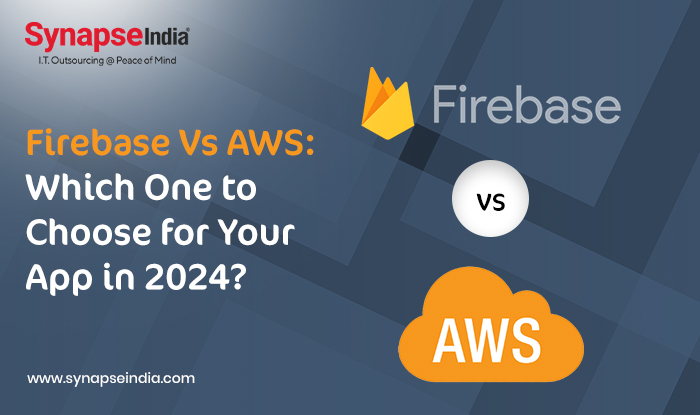 26 Dec 2023
26 Dec 2023
In the landscape of cloud computing, developers and businesses have many options to choose from when it comes to backend services. Firebase vs AWS are prominent players in this space. Each platform offers a comprehensive set of tools and services, catering to diverse needs and preferences. In this blog, we'll explore the key features and distinctions between AWS and Firebase, shedding light on their respective strengths and use cases.
Firebase, developed by Google, is a mobile and web application development platform that provides a unified set of tools and services for building scalable and feature-rich applications. Firebase excels in its ease of use and real-time data synchronization capabilities. Firebase features include services such as Realtime Database, Authentication, Cloud Functions, Hosting, and more, making it a compelling choice for startups and developers looking for a quick and seamless development experience.
Amazon Web Services (AWS), a comprehensive cloud computing platform offered by Amazon, is known for its extensive range of services and global infrastructure. AWS caters to a broad spectrum of needs, from computing power and storage to machine learning and Internet of Things (IoT) solutions. AWS features flexibility and scalability making it a top choice for enterprises and large-scale applications, offering a vast ecosystem of services like Amazon EC2, S3, Lambda, and more.

| Feature/Aspect | Firebase | AWS |
|---|---|---|
| Scope and Use Cases | Primarily suited for mobile and web apps, real-time applications, and smaller projects. | Versatile, catering to a wide range of applications, from small to enterprise-level projects. |
| Ease of Use | User-friendly interface, quick setup, and simpler configuration. Ideal for rapid development. | Extensive services may have a steeper learning curve, especially for beginners, but offers great flexibility. |
| Real-time Database | Firebase Realtime Database provides real-time synchronization, suitable for collaborative and interactive applications. | AWS offers Amazon DynamoDB for NoSQL database needs, providing scalability and low-latency access. |
| Themes and Templates | Extensive theme selection with a focus on responsiveness | Large selection of themes with customization capabilities |
| Authentication | Firebase Authentication provides easy integration for user authentication with various methods. | AWS Cognito offers robust user identity and access management services with support for various authentication providers. |
| Hosting | Firebase Hosting is straightforward for deploying web apps with a global Content Delivery Network (CDN). | AWS offers Amazon S3 for static website hosting and Amazon CloudFront for CDN, providing flexibility and scalability. |
| Serverless Computing | Firebase Cloud Functions allow serverless computing with event-driven functions. | AWS Lambda is a powerful serverless computing service, integrated with other AWS services like API Gateway for complete serverless applications. |
| Computer Services | Firebase primarily focuses on mobile and web application backend services. | AWS provides a vast array of computing services including EC2 (virtual servers), ECS (container service), and Lambda (serverless computing). |
| Storage Solutions | Firebase offers Cloud Storage for Firebase, suitable for storing user-generated content. | AWS provides Amazon S3 for scalable object storage and EBS for block storage, meeting various storage needs. |
| Machine Learning | Firebase ML Kit provides easy-to-use machine learning features for mobile apps. | AWS offers comprehensive machine learning services through Amazon SageMaker, with support for deep learning frameworks and custom models. |
| Global Infrastructure | Firebase relies on Google's infrastructure, with data centers strategically located worldwide. | AWS boasts a vast global infrastructure with data centers in multiple regions, offering high availability and low-latency access. |
| Enterprise Support | Firebase is well-suited for startups and smaller projects but may have limited enterprise-level features. | AWS is widely adopted by enterprises, providing a robust set of features, compliance, and support for complex requirements. |
Both Firebase vs AWS have their unique strengths and use cases. Firebase stands out for its simplicity, real-time capabilities, and quick setup, making it ideal for projects with tight timelines or those focused on mobile and web app development. On the other hand, AWS shines in its versatility, providing a vast array of services suitable for complex and large-scale applications and enterprises with diverse requirements.
Ultimately, the choice between Firebase vs AWS depends on factors such as the scale of the project, specific feature requirements, development preferences, and the target audience. As we delve deeper into the comparison, we'll explore these aspects to help you make an informed decision based on your specific use case.


 08 Sep 2014
08 Sep 2014
